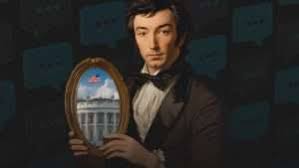
Breaking News
It's Time For Christian Zionists To Put Their Money Where Their Mouth Is
 Trump's Market Whiplash Continues
Trump's Market Whiplash Continues
 The IRS Isn't Going Away, and This Is How We Know
The IRS Isn't Going Away, and This Is How We Know
 Donald Trump is Making the Case for BRICS
Donald Trump is Making the Case for BRICS
Top Tech News
 Kawasaki CORLEO Walks Like a Robot, Rides Like a Bike!
Kawasaki CORLEO Walks Like a Robot, Rides Like a Bike!
 World's Smallest Pacemaker is Made for Newborns, Activated by Light, and Requires No Surgery
World's Smallest Pacemaker is Made for Newborns, Activated by Light, and Requires No Surgery
 Barrel-rotor flying car prototype begins flight testing
Barrel-rotor flying car prototype begins flight testing
 Coin-sized nuclear 3V battery with 50-year lifespan enters mass production
Coin-sized nuclear 3V battery with 50-year lifespan enters mass production
 BREAKTHROUGH Testing Soon for Starship's Point-to-Point Flights: The Future of Transportation
BREAKTHROUGH Testing Soon for Starship's Point-to-Point Flights: The Future of Transportation
 Molten salt test loop to advance next-gen nuclear reactors
Molten salt test loop to advance next-gen nuclear reactors
 Quantum Teleportation Achieved Over Internet For The First Time
Quantum Teleportation Achieved Over Internet For The First Time
 Watch the Jetson Personal Air Vehicle take flight, then order your own
Watch the Jetson Personal Air Vehicle take flight, then order your own
 Microneedles extract harmful cells, deliver drugs into chronic wounds
Microneedles extract harmful cells, deliver drugs into chronic wounds
 SpaceX Gigabay Will Help Increase Starship Production to Goal of 365 Ships Per Year
SpaceX Gigabay Will Help Increase Starship Production to Goal of 365 Ships Per Year
Tocqueville's Mirror

Every great book is a mirror in which the reader sees himself. Alexis de Tocqueville didn't journey across the United States to write a travelogue—he set out to craft a mirror. He wasn't interested in landscapes or monuments. He wanted to understand democracy not as an abstract theory but as a living, breathing reality. He wanted to see its people—their passions, their dreams, the way they lived, worked, and shaped their own future. But more than all of that, he wanted them to see themselves.
His concern wasn't that democracy would collapse overnight in a violent coup. Nor did he fear the rise of radical ideologies, from the left or the right, as much as something far more insidious: the slow suffocation of freedom under layers of bureaucracy, endless rules, the tyranny of the majority, and growing public apathy. He saw it coming. And, in many ways, we're living it today.
Some call Tocqueville a doomsayer. Others argue he was an optimist who admired America. Both are only half right. He believed that equality—the cement of democracy—would inevitably triumph throughout Christendom. The real question, he thought, was not whether democracy would spread, but whether it could preserve freedom along the way. The great challenge before humanity was to build an ark strong enough to sail the "ocean without shores" of equality. For Tocqueville, freedom was like the younger sibling of equality—more beautiful and good, but more fragile. Something sacred. Something without which Man could not truly be Man.
The Invisible Chains of Soft Despotism
Bit by bit, we've grown comfortable letting others make decisions for us. And we tell ourselves it's fine. Life is exhausting—work, family, responsibilities. And when we do get a moment to breathe, the last thing we want is to wade into the swamp of political arguments and online outrage. Aren't we exhausted by the constant scandals in the news cycle?
So, we check out. And while we're watching the Duttons fight for their ranch in Yellowstone (great show, by the way), scrolling on social media, or just trying to get some sleep, something happens. We lose control over our own lives.
Tocqueville had a name for this: soft despotism. It's not a brutal dictatorship. There are no tanks in the streets, no midnight arrests. It's worse. It's a system that lulls us into complacency, convinces us that everything is fine, and keeps us indifferent—until one day, we wake up to find that freedom is a hollow shell.



